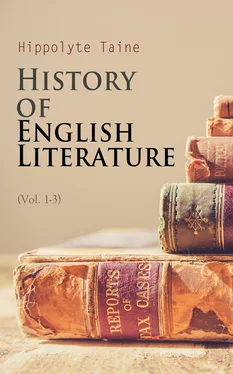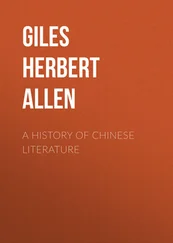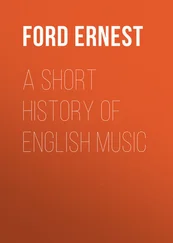SECTION VI.—Christian Poems
Table of Contents
A race so constituted was predisposed to Christianity, by its gloom, its aversion to sensual and reckless living, its inclination for the serious and sublime. When their sedentary habits had reconciled their souls to a long period of ease, and weakened the fury which fed their sanguinary religion, they readily inclined to a new faith. The vague adoration of the great powers of nature, which eternally fight for mutual destruction, and, when destroyed, rise up again to the combat, had long since disappeared in the dim distance. Society, on its formation, introduced the idea of peace and the need for justice, and the war-gods faded from the minds of men, with the passions which had created them. A century and a half after the invasion by the Saxons, [69]Roman missionaries, bearing a silver cross with a picture of Christ, came in procession chanting a litany. Presently the high priest of the Northumbrians declared in presence of the nobles that the old gods were powerless, and confessed that formerly "he knew nothing of that which he adored"; and he among the first, lance in hand, assisted to demolish their temple. Then a chief rose in the assembly, and said:
"You remember, it may be, O king, that which sometimes happens in winter when you are seated at table with your earls and thanes. Your fire is lighted, and your hall warmed, and without is rain and snow and storm. Then comes a swallow flying across the hall; he enters by one door, and leaves by another. The brief moment while he is within is pleasant to him; he feels not rain nor cheerless winter weather; but the moment is brief—the bird flies away in the twinkling of an eye, and he passes from winter to winter. Such, methinks, is the life of man on earth, compared with the uncertain time beyond. It appears for a while; but what is the time which comes after—the time which was before? We know not. If, then, this new doctrine may teach us somewhat of greater certainty, it were well that we should regard it."
This restlessness, this feeling of the infinite and dark beyond, this sober, melancholy eloquence, were the harbingers of spiritual life. [70]We find nothing like it amongst the nations of the south, naturally pagan, and preoccupied with the present life. These utter barbarians embrace Christianity straightway, through sheer force of mood and clime. To no purpose are they brutal, heavy, shackled by infantine superstitions, capable, like King Canute, of buying for a hundred golden talents the arm of Augustine. They possess the idea of God. This grand God of the Bible, omnipotent and unique, who disappears almost entirely in the Middle Ages, [71]obscured by His court and His family, endures amongst them in spite of absurd or grotesque legends. They do not blot Him out under pious romances, by the elevation of the saints, or under feminine caresses, to benefit the infant Jesus and the Virgin. Their grandeur and their severity raise them to His high level; they are not tempted, like artistic and talkative nations, to replace religion by a fair and agreeable narrative. More than any race in Europe, they approach, by the simplicity and energy of their conceptions, the old Hebraic spirit. Enthusiasm is their natural condition; and their new Deity fills them with admiration, as their ancient deities inspired them with fury. They have hymns, genuine odes, which are but a concrete of exclamations. They have no development; they are incapable of restraining or explaining their passion; it bursts forth, in raptures, at the vision of the Almighty. The heart alone speaks here—a strong, barbarous heart. Cædmon, their old poet, [72]says Bede, was a more ignorant man than the others, who knew no poetry; so that in the hall, when they handed him the harp, he was obliged to withdraw, being unable to sing like his companions. Once, keeping night-watch over the stable, he fell asleep. A stranger appeared to him, and asked him to sing something, and these words came into his head: "Now we ought to praise the Lord of heaven, the power of the Creator, and His skill, the deeds of the Father of glory; how he, being eternal God, is the author of all marvels; who, almighty guardian of the human race, created first for the sons of men the heavens as the roof of their dwelling, and then the earth." Remembering this when he woke, [73]he came to the town, and they brought him before the learned men, before the abbess Hilda, who, when they had heard him, thought that he had received a gift from heaven, and made him a monk in the abbey. There he spent his life listening to portions of Holy Writ, which were explained to him in Saxon, "ruminating over them like a pure animal, turned them into most sweet verse." Thus is true poetry born. These men pray with all the emotion of a new soul; they kneel; they adore; the less they know the more they think. Someone has said that the first and most sincere hymn is this one word O! Theirs were hardly longer; they only repeated time after time some deep passionate word, with monotonous vehemence. "In heaven art Thou, our aid and succor, resplendent with happiness! All things bow before Thee, before the glory of Thy Spirit. With one voice they call upon Christ; they all cry: Holy, holy art Thou, King of the angels of heaven, our Lord! and Thy judgments are just and great; they reign forever and in all places, in the multitude of Thy works." We are reminded of the songs of the servants of Odin, tonsured now, and clad in the garments of monks. Their poetry is the same; they think of God, as of Odin, in a string of short, accumulated, passionate images, like a succession of lightning-flashes; the Christian hymns are a sequel to the pagan. One of them, Adhelm, stood on a bridge leading to the town where he lived, and repeated warlike and profane odes as well as religious poetry, in order to attract and instruct the men of his time. He could do it without changing his key. In one of them, a funeral song, Death speaks. It was one of the last Saxon compositions, containing a terrible Christianity, which seems at the same time to have sprung from the blackest depths of the Edda. The brief metre sounds abruptly, with measured stroke, like the passing bell. It is as if we hear the dull resounding responses which roll through the church, while the rain beats on the dim glass, and the broken clouds sail mournfully in the sky; and our eyes, glued to the pale face of a dead man feel beforehand the horror of the damp grave into which the living are about to cast him.
"For thee was a house built ere thou wert born; for thee was a mould shapen ere thou of thy mother earnest. Its height is not determined, nor its depth measured; nor is it closed up (however long it may be) until I thee bring where thou shalt remain; until I shall measure thee and the sod of the earth. Thy house is not highly built; it is unhigh and low. When thou art in it, the heel-ways are low, the sideways unhigh. The roof is built thy breast full high; so thou shalt in earth dwell full cold, dim, and dark. Doorless is that house, and dark it is within. There thou art fast detained, and Death holds the key. Loathly is that earth-house, and grim to dwell in. There thou shalt dwell, and worms shall share thee. Thus thou art laid, and leavest thy friends. Thou hast no friend that will come to thee, who will ever inquire how that house liketh thee, who shall ever open for thee the door, and seek thee, for soon thou becomest loathly and hateful to look upon." [74]
Has Jeremy Taylor a more gloomy picture? The two religious poetries, Christian and pagan, are so like, that one might mingle their incongruities, images, and legends. In Beowulf, altogether pagan, the Deity appears as Odin, more mighty and serene, and differs from the other only as a peaceful Bretwalda [75]differs from an adventurous and heroic bandit-chief. The Scandinavian monsters, Jötuns, enemies of the Æsir, [76]have not vanished; but they descend from Cain, and the giants drowned by the flood. [77]Their new hell is nearly the ancient Nástrand, [78]"a dwelling deadly cold, full of bloody eagles and pale adders"; and the dreadful last day of judgment, when all will crumble into dust, and make way for a purer world, resembles the final destruction of Edda, that "twilight of the gods," which will end in a victorious regeneration, an everlasting joy "under a fairer sun."
Читать дальше












